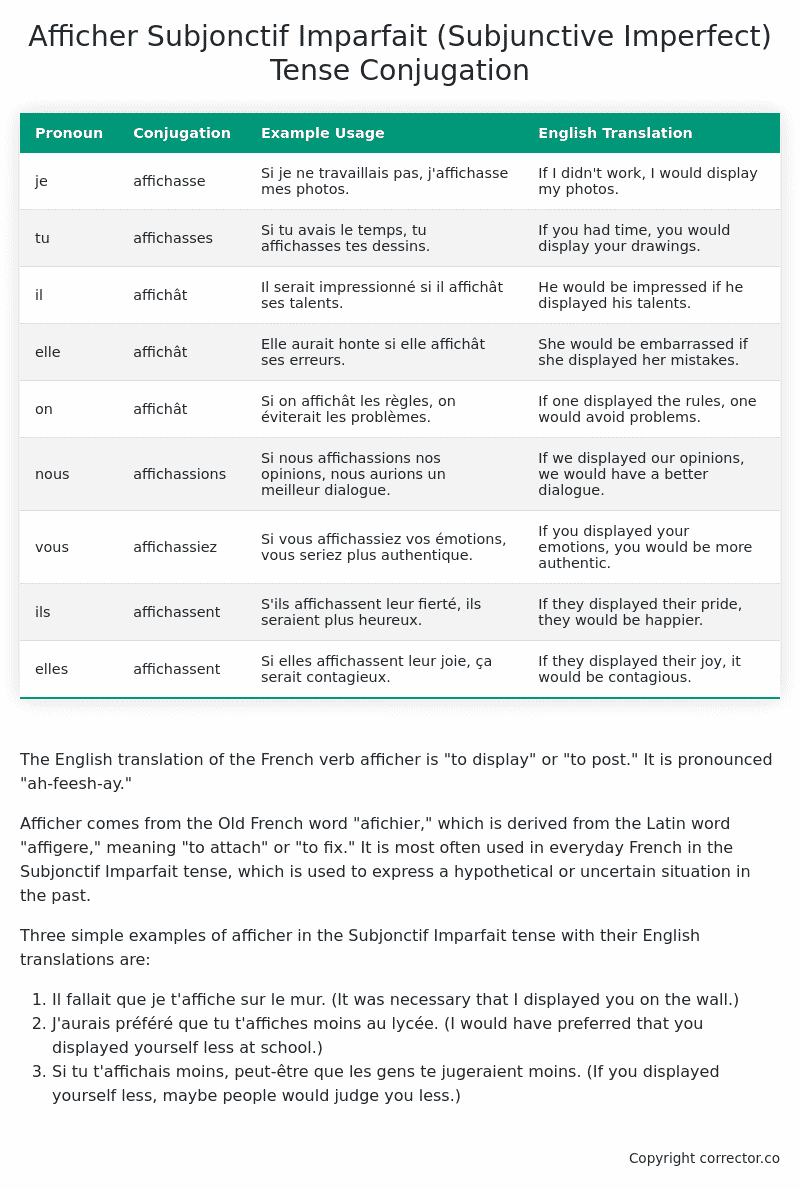Subjonctif Imparfait (Subjunctive Imperfect) Tense Conjugation of the French Verb afficher
Introduction to the verb afficher
The English translation of the French verb afficher is “to display” or “to post.” It is pronounced “ah-feesh-ay.”
Afficher comes from the Old French word “afichier,” which is derived from the Latin word “affigere,” meaning “to attach” or “to fix.” It is most often used in everyday French in the Subjonctif Imparfait tense, which is used to express a hypothetical or uncertain situation in the past.
Three simple examples of afficher in the Subjonctif Imparfait tense with their English translations are:
- Il fallait que je t’affiche sur le mur. (It was necessary that I displayed you on the wall.)
- J’aurais préféré que tu t’affiches moins au lycée. (I would have preferred that you displayed yourself less at school.)
- Si tu t’affichais moins, peut-être que les gens te jugeraient moins. (If you displayed yourself less, maybe people would judge you less.)
Table of the Subjonctif Imparfait (Subjunctive Imperfect) Tense Conjugation of afficher
| Pronoun | Conjugation | Example Usage | English Translation |
|---|---|---|---|
| je | affichasse | Si je ne travaillais pas, j’affichasse mes photos. | If I didn’t work, I would display my photos. |
| tu | affichasses | Si tu avais le temps, tu affichasses tes dessins. | If you had time, you would display your drawings. |
| il | affichât | Il serait impressionné si il affichât ses talents. | He would be impressed if he displayed his talents. |
| elle | affichât | Elle aurait honte si elle affichât ses erreurs. | She would be embarrassed if she displayed her mistakes. |
| on | affichât | Si on affichât les règles, on éviterait les problèmes. | If one displayed the rules, one would avoid problems. |
| nous | affichassions | Si nous affichassions nos opinions, nous aurions un meilleur dialogue. | If we displayed our opinions, we would have a better dialogue. |
| vous | affichassiez | Si vous affichassiez vos émotions, vous seriez plus authentique. | If you displayed your emotions, you would be more authentic. |
| ils | affichassent | S’ils affichassent leur fierté, ils seraient plus heureux. | If they displayed their pride, they would be happier. |
| elles | affichassent | Si elles affichassent leur joie, ça serait contagieux. | If they displayed their joy, it would be contagious. |
Other Conjugations for Afficher.
Le Present (Present Tense) Conjugation of the French Verb afficher
Imparfait (Imperfect) Tense Conjugation of the French Verb afficher
Passé Simple (Simple Past) Tense Conjugation of the French Verb afficher
Passé Composé (Present Perfect) Tense Conjugation of the French Verb afficher
Futur Simple (Simple Future) Tense Conjugation of the French Verb afficher
Futur Proche (Near Future) Tense Conjugation of the French Verb afficher
Plus-que-parfait (Pluperfect) Tense Conjugation of the French Verb afficher
Passé Antérieur (Past Anterior) Tense Conjugation of the French Verb afficher
Futur Antérieur (Future Anterior) Tense Conjugation of the French Verb afficher
Subjonctif Présent (Subjunctive Present) Tense Conjugation of the French Verb afficher
Subjonctif Passé (Subjunctive Past) Tense Conjugation of the French Verb afficher
Subjonctif Imparfait (Subjunctive Imperfect) Tense Conjugation of the French Verb afficher (this article)
Subjonctif Plus-que-parfait (Subjunctive Pluperfect) Tense Conjugation of the French Verb afficher
Conditionnel Présent (Conditional Present) Tense Conjugation of the French Verb afficher
Conditionnel Passé (Conditional Past) Tense Conjugation of the French Verb afficher
L’impératif Présent (Imperative Present) Tense Conjugation of the French Verb afficher
L’infinitif Présent (Infinitive Present) Tense Conjugation of the French Verb afficher
Struggling with French verbs or the language in general? Why not use our free French Grammar Checker – no registration required!
Get a FREE Download Study Sheet of this Conjugation 🔥
Simply right click the image below, click “save image” and get your free reference for the afficher Subjonctif Imparfait tense conjugation!

Afficher – About the French Subjonctif Imparfait (Subjunctive Imperfect) Tense
Formation
Common Everyday Usage Patterns
Interactions with Other Tenses
Subjonctif Présent
Indicatif Passé Composé
Conditional
Conditional Perfect
Summary
I hope you enjoyed this article on the verb afficher. Still in a learning mood? Check out another TOTALLY random French verb conjugation!


